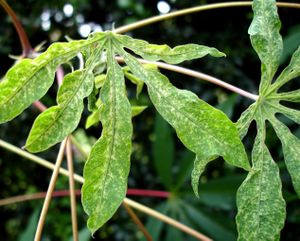Mononychellus tanajoa
| Literature database |
|---|
| 98 articles sorted by: |
| • year (descending) |
| • research topics |
| • countries/regions |
| • host plants |
| • list of natural enemies |

Author(s): F. Haas, icipe
Source: Infonet-biovision
Mononychellus tanajoa (Bondar) - (cassava green mite)
The mite is native to South America, but has been accidentally introduced into western Africa around 1970. It has spread to many cassava growing areas of Africa and since 2010 there have been also reports of that species from Asia.
It can cause yield losses of up to 80% and feeds mainly on the young leaves. Heavy damage leads to chlorosis, stunting as well as reduced tuber size and quality. Control depends mainly on the use of predatory mites. E.g., the South American predatory mites Amblydromalus manihoti and Typhlodromalus aripo have been introduced into Africa against this pest.
| Vernacular names | |
|---|---|
| • Deutsch: | Grüne Maniokmilbe |
| • English: | cassava green mite |
| • Español: | ácaro verde de la yuca |
The development from egg to adult can be completed in around 2 weeks. The adults are around ½ mm long. While long distance spread obviously occurs through the transport of infested host plants, the mite can also disperse through the wind.
Synonyms:
Mononychellus progresivus